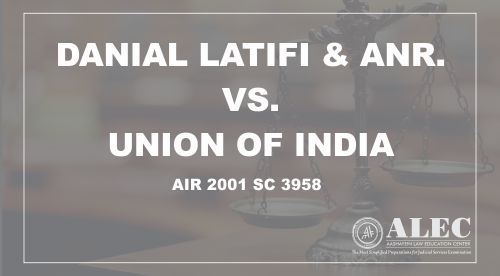Danial Latifi & Anr.
vs.
Union Of India
[AIR 2001 SC 3958]
DATE OF THE JUDGMENT- 28.09.2001
BENCH- D. Raju, D P Mohapatra, G B Pattanaik, S R Babu, S V Patil
BACKGROUND OF THE CASE- this case was filed to challenge the constitutional validity of the “Muslim Women (Protection of Rights on Divorce) Act, 1986” [herein after referred to as MWPRD Act], which was enacted by the Government to nullify the verdict given by the SC in ‘Mohd. Ahmed Khan v Shah Bano Begum’, which cites the victory story of a 62 year old Muslim woman for her right to maintenance from her husband under section 125 of CrPC who had divorced her. The then government enacted the MWPRD Act, 1986 to nullify the judgment given by the SC as a result of which she was denied her maintenance. The Act under Sec. 3 clause (1) (a), provided that the divorced Muslim woman is entitled to maintenance only up to the period of ‘iddat’ (the period of three months to be observed by the woman before the final completion of divorce takes place under muslim law) and not subsequent to that thereby leaving the responsibility of maintaining such divorced wife on the shoulders of the relatives and after them the Waqf Board. It is to be noted here that other women belonging to other religion religion remained unaffected by this Act as they could still seek relief under Sec. 125 of the CrPC. Therefore a writ petition was filed in the year 2001 in the SC challenging the constitutional validity of the Act as being violative Art. 14 of the Constitution of India as it infringes the right of the Muslim women by separating them from other women when it comes to seeking relief under Sec. 125 of the CrPC, thus depriving them of their right to life guaranteed under Art. 21 of the Indian Constitution. Thus the Act was majorly challenged being violative of Arts. 14, 15 and 21.
ARGUMENTS RAISED BEFORE THE COURT-
BY THE PETITIONER:
- That Art. 14 of the Indian Constitution stands violated if the Muslim women are not benefitted by the remedies available under Sec. 125 of the CrPC on the ground of unequal protection of laws.
- That Art. 15 stands violated by not applying the provision of Sec. 125 as this provision is secular in nature and the MWPRD Act, 1986 was discriminating in nature towards Muslim women on the ground of sex and religion.
- That the whole purpose of Sec. 125 was to benefit the divorced women and not applying it to the benefit of divorced Muslim women would infringe their right to life and personal liberty guaranteed under Art. 21.
You can also read the Blog by visiting [Blog]
For more information, visit [Aashayein Enquiry Section]
BY THE DEFENDANT:
- That the Muslim Personal Law overrides Section 125 of the CrPC, therefore the court should apply the former [the Muslim Personal Law mentioned here is the “Shariat Act, 1937”].
- That the Muslim women cannot seek maintenance beyond the ambit of the Muslim Personal Law and therefore applying Sec. 125 would stand at conflict with the personal law.
- That in case the union legislature has to apply Sec. 125 on muslims then it should amend it, and make necessary changes so as not to go beyond the Muslim Personal Law.
ISSUES INVOLVED:
- The first question was related to the interpretation of Sec. 127 (3) (b) of the CrPC that whether paying maintenance to the divorced muslim woman under the Muslim Personal law which is known as ‘mehr’or ‘mehar’ would indemnify the husband to provide maintenance under Sec. 125 of the CrPC.
- That whether ‘mahr’ could be treated as an alternative to the order of maintenance.
FINAL VERDICT:
The court upheld the validity of the Act and made the following observations in its final verdict:
- the liability of the muslim husband to maintain the divorced wife with a fair and reasonable provision extends beyond the ‘iddat’ period and this provision has to be made by him within the period of iddat under the terms of Sec. 3 (1) (a) of the MWPRD Act, 1986.
- The word ‘within’ used in the above mentioned provision does not mean for iddat period. It means that the liability to provide a reasonable and fair provision within this period might extend to the entire life of such a woman until she remarries. This amount of maintenance sufficient to sustain her for her entire life has to be paid in totality within the period of ‘iddat’ in advance for her future, otherwise the liability extends beyond.
- This liability is not confined to the period of ‘iddat’ as per Sec 3 (1) (a) of the Act.
- if any divorced muslim woman is unable to maintain herself and who has not remarried, she after the period of ‘iddat’ can take recourse to Sec. 4 of the Act which provides that the maintenance has to be provided in proportion out of her property by the relatives who inherit her property after her death. Such relatives shall include her children as well as her parents even.
- If the relatives are unable to maintain her then she shall be provided maintenance by the State Waqf Board as directed by the court.
- That meher or mahr is the sum that payable on the agreement of marriage and it more closely connected to the marriage than to the divorce, therefore payment of meher would not absolve the husband of his liability to pay the maintenance on divorcing his wife.
- The provisions of the Act do not violate Art. 14, 15 and 21 as alleged in the petition.
THE CONCLUSION
The SC through this case tried to strike a balance between the law and the muslim communities. It has tried to reduce the communal tensions that grew in response to the verdict pronounced in the Shah Bano case.

